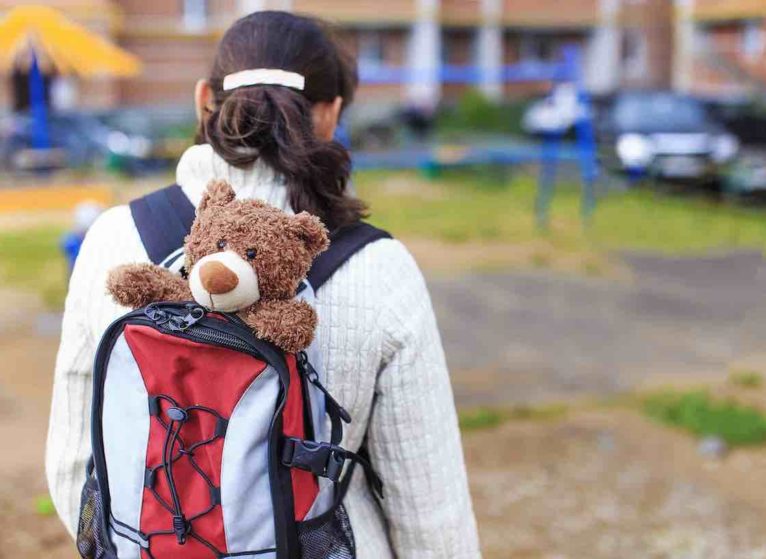No single path leads kids into foster care. Every child’s story is unique. Each is complex. Poverty, neglect, trauma, abuse. These can all lead to a change in a child's living situation. No matter the reason, children in foster care need a safe place to land. They also need people they can trust to care for them.
Our community has many resources to support foster kids. Yet, consistent coordination and communication among these groups is challenging. Many hands reach out to offer help. But too often the chain breaks over time, and kids fall through the cracks.
Pediatric nurse practitioner Stephanie McNerney, CPNP, works to close the gaps in support. She and her team launched the Village Care Program (VCP) at UVA Health Children’s. It connects children in foster care and other unique living situations to the healthcare they need.
Team Trained to Care for Kids Impacted by Difficult Experiences
“The Village Care Program is a personal and professional dream of mine,” says McNerney. “My husband and I are trained foster parents, so I’ve seen firsthand how challenging it is for these families. And as a nurse in developmental pediatrics, I know children in foster care are more likely to have complex medical and mental health needs. It takes an extra level of care coordination to be sure they get what they need.”
In other words, it takes a village. And not any village. It takes a village of dedicated people trained to care for kids affected by trauma. “Everyone in UVA Children’s Hospital has had trauma training,” she says. “They understand the complexities of foster care situations.”
The VCP team provides trauma-informed care. They consider a child’s experiences. The team knows what questions to ask. They also recognize the signs of trauma and stress, which can present in a variety of ways, from health problems to learning delays.
Meeting the Complex Needs of Children in Foster Care
The Village Care Program began in January 2022 after years of thoughtful planning. It is open to all children in the region in foster care, a group home, or other unique living situation. Kids need a referral from the Charlottesville Department of Social Services. A UVA Children's provider can also refer a child. McNerney says she and her team have admitted around 30 kids into the program so far.
“The goal is to get these kids into our clinic within 72 hours after their referral,” says McNerney. “Then we can take a stepwise approach to prioritizing the child’s needs.”
Physical Health & Safety
At the child’s first clinic visit, the team looks at their medical needs. Doctors make sure they’re healthy and safe. They refer them to specialists to address medical issues and get needed medications. This is a chance for foster families to:
- Learn more about the child
- Develop a relationship with the team of care providers
- Get tips on building a connection with the child
Mental Health Check
Within a few months of the first clinic visit, kids return for more screenings. These include a mental health screening and behavioral, developmental, and educational assessments. “Based on these assessments, we can get kids the support they need. We can also offer guidance about what kids need now and in the future to be their best selves,” says McNerney.
Sharing Is Caring
With so many people involved in a child's care, sharing information is key. This is why McNerney stresses the importance of one complete health plan for each child.
The VCP team creates a document called a Health Passport. This is a personalized health and wellness plan. It's based on the results of the child’s clinic visit and health screenings. The plan stays in the child’s health record so all care providers can see it. Social workers, school counselors, foster and biological families, and others can also get a copy.
The Health Passport documents the child’s:
- Medical history
- Educational history
- Social and family history
- Developmental history
- Care team members
- Long- and short-term goals
“The Health Passport helps make sure everyone involved in the child’s care has the most up-to-date information,” says McNerney.
Giving Parents of Children in Foster Care a Chance
When McNerney says “everyone,” she means everyone. This includes the child’s biological parents or those from their home of origin. “These situations are complicated. There are many reasons why children enter the foster care system. It may be, in part, because of systemic injustices and lack of support,” she says. “We can’t fix all those things. But we can help support families staying together. The biological family should be involved in decisions and be informed about the care their child is getting.”
The VCP team includes the child’s biological family in the child’s health plan and goal-setting. The family can also meet with the child's care team.
“The biological parents are often the last to get information about their child. But we set up a telehealth appointment with the biological family right away. We discuss exactly what was covered during their child’s clinic visit,” says McNerney. This helps keep the parents involved, which furthers efforts to reunify and reconnect the family.
VCP is just getting started. McNerney says she believes this program can do more to bridge our area's organizations that support children in foster care. “There's a lot of opportunity for educators, therapists, healthcare providers, nonprofits, and others to come together,” she says. “I hope the Village Care Program will be a model of care for other communities. It’s going to take collaboration to make that happen.”
Resources for Foster Parents
Is Your Child Missing Key Milestones?
Doctors often can treat delays in language and motor skills if caught early.
If you're caring for a child in foster care or a child who has experienced past trauma, McNerney recommends these resources.
This site has tools to help children process difficult topics. Things like divorce, being in foster care, grief, and more.
The National Child Traumatic Stress Network (NCTSN)
One of the largest resources for people working with children exposed to trauma. The goal is to improve care for children and families who have experienced trauma.
Child Welfare Information Gateway
This service promotes the safety and well-being of children and families. It connects child welfare, adoption, and others to information, resources, and tools. Covers child welfare, child abuse and neglect, adoption, and more topics.
Tools to help parents improve their parenting and communication. Focuses on skill-building and problem-solving.


